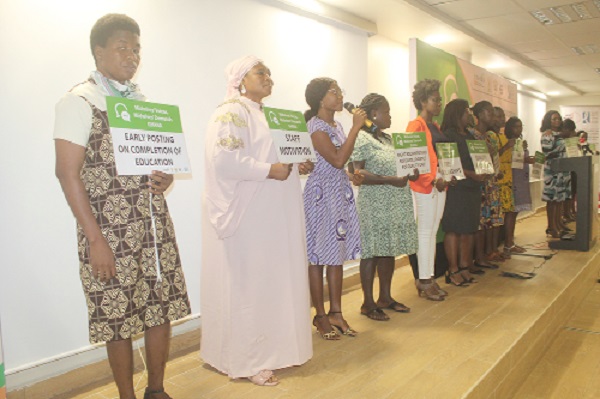The Centre for Health Development and Research (CEHDAR), a health system strengthening non-governmental organisation (NGO), has launched a campaign for improved work environment and conditions for midwives in Ghana.
Dubbed: “Midwives’ Voices, Midwives’ Demands”, the campaign underscores how good conditions contribute to the motivation of staff, their peace of mind and ultimately to their performance.
The campaign was characterised by the display of flashcards by 16 midwives representing the 16 regions, with inscriptions about their struggles in the line of duty.
Some of the messages on the flashcards bordered on accommodation, scholarships and exchange programmes, salary, capacity building, equipment and working resources, among others.
The campaign was in partnership with the Ghana Health Service, the Ministry of Health, and two other NGOs: What Women Want and White Ribbon Alliance.
In attendance were representatives of nurses and midwives from regional, teaching hospitals and the private sector, United Nations Population Fund (UNFPA) and World Health Organisation, among others.
At the launch in Accra last Thursday, the President of CEHDAR, Dr Jemima Dennis-Antwi, said the campaign was borne out of a survey in all 16 regions where midwives were asked to point out what they needed most to enable them provide what women wanted so far as their duty was concerned.
Capacity building
Dr Dennis-Antwi added that evidence in many studies had shown that where a midwife was well-trained, regulated, resourced and supported, she was able to address over 80 per cent of pregnancy-related complications that arose.
“However, they can only succeed if a professional enabling environment is available.
In Ghana, the most challenging roles have been rural posting to community-based health planning and services (CHPS) zones, as well as the bedside, and we want better conditions.
These demands are not new; they are in consonance with the provisions of many global and local Ghana-based policies of the health sector,” she said.
Strategic and policy-related issues
The Director of Human Resource of the GHS, Peter Obiri Yeboah, stated that Ghana’s health sector had in diverse ways worked with midwives to address notable strategic and policy-related issues.
“We had to invest in producing more midwives through the re-introduction of direct-entry midwifery education to contribute to the achievement of the set target of reducing maternal mortality ratio by 75 per cent by 2015.
“Through multi-strategic approaches such as the introduction of free maternal health services, national health insurance scheme, CHPS and midwifery education served to increase access to skilled birth and to reduce some of the inequities to health care,” he said.
“Today, we have thousands of midwives graduating from our many institutions ready to impact our maternal and newborn indices to achieve the Sustainable Development Goals aimed, among others, to reduce global maternal mortality ratio to less than 70 per 100,000 live births, and to end preventable deaths of newborn and children under five years of age,” he said.
Commendation
Mr Yeboah commended midwives for their contributions and dedication.
“However, there is still more work to be done if Ghana is to achieve the set targets, which can only be achieved when women are able to utilise the full continuum of maternal healthcare irrespective of location, socio-economic or demographic traits.
“We are concerned that a greater section of women in Ghana are unable to meet these recommendations due to several setbacks such as poverty, limited or no education, rural residency, as well as the socio-cultural beliefs and convictions that sometimes dissuade women from accessing these quality services,” Mr Yeboah added.
Credit: Graphic Online


Comments are closed.